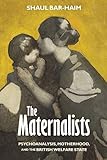The Maternalists : Psychoanalysis, Motherhood, and the British Welfare State / Shaul Bar-Haim.
Material type: TextSeries: Intellectual History of the Modern AgePublisher: Philadelphia : University of Pennsylvania Press, [2021]Copyright date: ©2021Description: 1 online resource (352 p.)Content type:
TextSeries: Intellectual History of the Modern AgePublisher: Philadelphia : University of Pennsylvania Press, [2021]Copyright date: ©2021Description: 1 online resource (352 p.)Content type: - 9780812299649
- Motherhood -- Political aspects -- Great Britain -- History -- 20th century
- Motherhood -- Psychological aspects -- History -- 20th century
- Psychoanalysis -- History -- 20th century
- Psychoanalysis -- Social aspects -- Great Britain -- History -- 20th century
- Welfare state -- Great Britain -- History -- 20th century
- HISTORY / Europe / Great Britain / 20th Century
- British psychoanalytic society
- History of welfare policy
- Maternalistic thinking
- Mother-centered culture
- Politics of motherhood
- Post WWI Great Britain
- Psychoanalysis and the public sphere
- Psychoanalysis in Britain
- Raymond Williams structure of feeling
- Sandor Ferenczi
- 150.2 23
- BF175
- online - DeGruyter
| Item type | Current library | Call number | URL | Status | Notes | Barcode | |
|---|---|---|---|---|---|---|---|
 eBook
eBook
|
Biblioteca "Angelicum" Pont. Univ. S.Tommaso d'Aquino Nuvola online | online - DeGruyter (Browse shelf(Opens below)) | Online access | Not for loan (Accesso limitato) | Accesso per gli utenti autorizzati / Access for authorized users | (dgr)9780812299649 |
Frontmatter -- CONTENTS -- Introduction -- Chapter 1. The “Sphincter- Morality” and Beyond: The Concept of Childhood in Interwar Psychoanalysis -- Chapter 2. How Children Think: Susan Isaacs and “Primitive” Thinking -- Chapter 3. Malinowski, Róheim, and the Maternal Shift in British Psychoanalysis and Anthropology -- Chapter 4. Imagining the “Maternal” Past: Ian Suttie and the Critique of Oedipal Culture -- Chapter 5. What About Father? Civic- Republican Maternalism and the Welfare State -- Chapter 6. “The Drug ‘Doctor’ ”: The Balint Movement and Psychosocial Medicine in Postwar Britain -- Conclusion -- Notes -- Bibliography -- Index -- Acknowledgments
restricted access online access with authorization star
http://purl.org/coar/access_right/c_16ec
The Maternalists is a study of the hitherto unexplored significance of utopian visions of the state as a maternal entity in mid-twentieth century Britain. Demonstrating the affinities between welfarism, maternalism, and psychoanalysis, Shaul Bar-Haim suggests a new reading of the British welfare state as a political project.After the First World War, British doctors, social thinkers, educators, and policy makers became increasingly interested in the contemporary turn being made in psychoanalytic theory toward the role of motherhood in child development. These public figures used new notions of the "maternal" to criticize modern European culture, and especially its patriarchal domestic structure. This strand of thought was pioneered by figures who were well placed to disseminate their ideas into the higher echelons of British culture, education, and medical care. Figures such as the anthropologists Bronislaw Malinowski and Geza Róheim, and the psychiatrist Ian Suttie—to mention only a few of the "maternalists" discussed in the book—used psychoanalytic vocabulary to promote both imagined perceptions of motherhood and their idea of the "real" essence of the "maternal." In the 1930s, as European fascism took hold, the "maternal" became a cultural discourse of both collective social anxieties and fantasies, as well as a central concept in many strands of radical, and even utopian, political thinking. During the Second World War, and even more so in the postwar era, psychoanalysts such as D. W. Winnicott and Michael Balint responded to the horrors of the war by drawing on interwar maternalistic thought, making a demand to "maternalize" British society, and providing postwar Britain with a new political idiom for defining the welfare state as a project of collective care.
Mode of access: Internet via World Wide Web.
In English.
Description based on online resource; title from PDF title page (publisher's Web site, viewed 01. Dez 2022)


